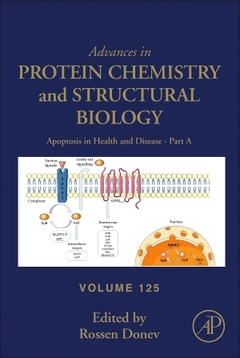Apoptosis in Health and Disease - Part A Advances in Protein Chemistry and Structural Biology Series
Coordonnateur : Donev Rossen

Apoptosis, or programmed cell death, is the mechanism by which cells die either physiologically or pathologically. A vast research in apoptosis has advanced our understanding of basic physiological and pathological processes occurring in cells, organs and organisms, and its role in a number of diseases. These new advanced understandings are playing a major influence in drug discovery and the introduction of new therapies that target this cell death process. These two thematic volumes 125 and 126 of the Advances in Protein Chemistry and Structural Biology focus on apoptotic responses in numerous conditions - from bacterial and parasite infections to pathological states such as oxidative stress, pulmonary hypertension, different cancer types, etc. Finally, therapeutic strategies for targeting apoptosis are also discussed.
Jorge Quarleri, Cintia Cevallos, and María Victoria Delpino
2. Reactive oxygen mediated apoptosis as a therapeutic approach against opportunistic Candida albicans
Tanu Atriwal, Meenal Chawla, Afzal Hussain, Mohamed F. Alajmi, and Mohammad Abid
3. TRPM2 channel in oxidative stress-induced mitochondrial dysfunction and apoptotic cell death
Philippa Malko, Ran Ding, and Lin-Hua Jiang
4. Intrinsic and extrinsic pathways of apoptosis: Role in cancer development and prognosis
Dharambir Kashyap, Vivek Kumar Garg, and Neelam Goel
5. Immunological and functional aspects of MAGEA3 cancer/testis antigen
Biswajit Das and Shantibhusan Senapati
6. Role of histone acetyltransferase inhibitors in cancer therapy
Muthu K. Shanmugam, Arunasalam Dharmarajan, Sudha Warrier, Anupam Bishayee, Alan Prem Kumar, Gautam Sethi, and Kwang Seok Ahn
7. Triggering the downstream apoptotic signal inside human parasitic organisms demonstrates a promising approach for anti-parasitic drug development: A mechanistic perspective
Nikhilesh Joardar, Niladri Mukherjee, Satyajit Halder, Kuladip Jana, and Santi P. Sinha Babu
8. Ferulic acid-mediated modulation of apoptotic signaling pathways in cancer
Ashutosh Gupta, Amit Kumar Singh, Mariam Loka, Abhay Kumar Pandey, and Anupam Bishayee
9. S1PR1 signaling in cancer: A current perspective
B. Anu, N.N. Namitha, and K.B. Harikumar
10. Phyto-drug conjugated nanomaterials enhance apoptotic activity in cancer
Karuppaiya Vimala and Soundarapandian Kannan
- Integrates experimental and computational methods for studying apoptosis in health and different diseases, strategies for identification of suitable therapeutic targets, and design of treatments targeting key points in apoptotic cascade
Date de parution : 04-2021
Ouvrage de 318 p.
15.2x22.8 cm
Thèmes d’Apoptosis in Health and Disease - Part A :
Mots-clés :
Acetyltransferases; Anticancer activity; Antimicrobial peptides; Apoptosis; Apoptosis-induction; Apoptosis-infection; Apoptosis-inhibition; Apoptotic cell death; Autophagy EMT; Bioavailability; Cancer; Cancer/testis antigen; Candida albicans; Diabetes; Drug delivery; Drug development; Drug resistance; Drug therapies; Execution pathway; Extrinsic pathway; Ferulic acid; FTY720; Function; Histone; Immune evasion; Immunotherapy; Inflammation; Intrinsic pathway; Ischemic stroke; MAGEA3; Metastasis; Mitochondrial dysfunction; MYST; Nanomaterials; Neurodegenerative diseases; p300/CBP; Pancreatic ß-cells; Parasitic diseases; Patient survival; Phyto-drug; Prognosis; Reactive oxygen species; ROS-reactive oxygen species; Signaling pathways; Sphingosine kinase; Sphingosine-1-phosphate; Synergistic effect; Tip60; TRPM2 channel



